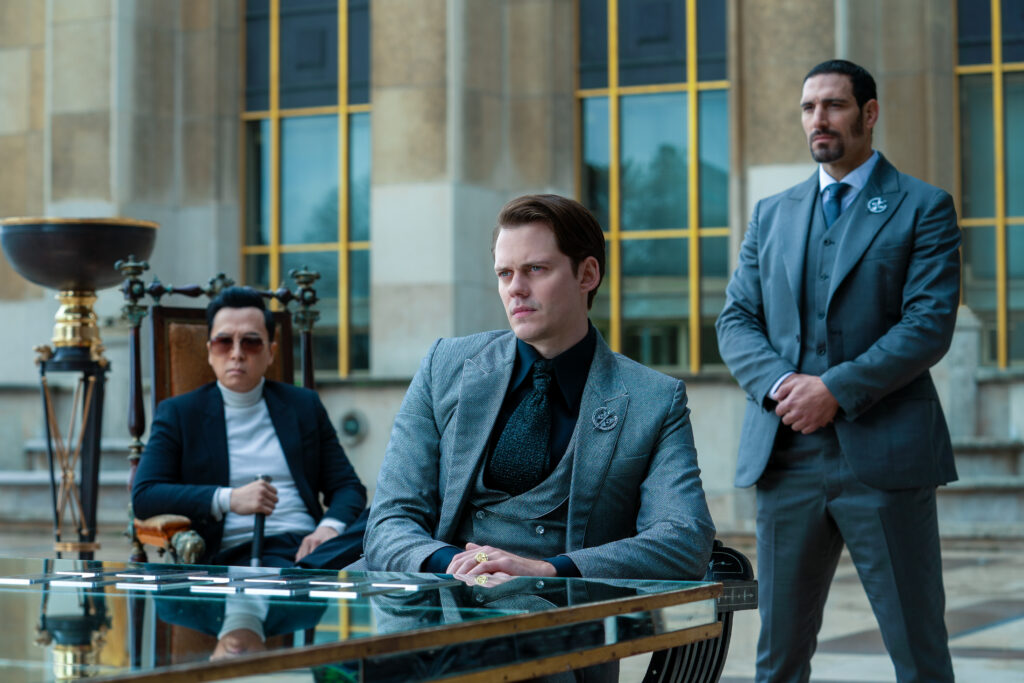December 26, 2023
by Carla Hay

Directed by Ilker Çatak
German with subtitles
Culture Representation: Taking place in an unnamed city in Germany, the dramatic film “The Teachers’ Lounge” features a predominantly white cast of characters (with some black people and people of Arabic heritage) representing the working-class and middle-class.
Culture Clash: At a middle school that is experiencing mysterious thefts, a teacher gets caught up in a scandal that is related to the thefts.
Culture Audience: “The Teachers’ Lounge” will appeal primarily to people who are interested in well-acted psychological thrillers about how people deal with ethical issues.

“The Teachers’ Lounge” is like a cauldron that effectively stirs up suspense and suspicion in this tale of a school thrown into chaos over theft accusations. Some viewers might not like how the movie ends, but the story in the film is riveting. The movie is best enjoyed by people who don’t mind film with conclusions that are open to interpretation.
Directed by Ilker Çatak (who co-wrote “The Teachers’ Lounge” screenplay with Johannes Duncker), “The Teachers’ Lounge” takes place in an unnamed city in Germany. The movie had its world premiere at the 2023 Berlin International Film Festival. “The Teachers’ Lounge” was also selected as German’s official entry in the Best International Feature Film category for the 2024 Academy Awards.
The central character in “The Teachers’ Lounge” is Carla Nowak (played by Leonie Benesch), a mathematics and physical education teacher at an unnamed middle school, where she teaches seventh graders. Carla is enthusiastic about her job, and she cares about her students. Her favorite student is Oskar Kuhn (played by Leonard Stettnisch), who has math skills that are far superior to everyone else in the Carla’s classroom. However, Oskar is socially awkward loner who is sometimes bullied by other students.
There has been increasing tension at the school, which has been experiencing thefts of personal items and cash. Students and school employees are victims of the thefts, which do not have a clear pattern of what will be taken or when. The school’s ongoing investigation has not resulted in any suspects. Observant viewers will notice at the beginning of the movie, the school has made it an internal investigation and haven’t filed any police reports.
An early scene in the movie shows two senior-level teachers named Milosz Dudek (played by Rafael Stachowiak) and Thomas Liebenwerda (played by Michael Klammer) meeting with two student representatives of the seventh-grade class: Lukas (played by Oscar Zickur) and Jenny (played by Antonia Küpper), who are given a list of students. Lukas and Jenny are then pressured by Milosz and Thomas to name any students on the list who are most likely to be suspects. Lukas and Jenny then reluctantly comply with this request.
It leads to Thomas and Milosz barging into Carla’s classroom unannounced to order the girls out of the classroom and then searching the wallets of the boys in the classroom. A student named Ali Yilmaz (played by Can Rodenbostel) is found to have a large amount of cash in his wallet. He is then taken out of the classroom and interrogated. Ali vehemently denies that the money was stolen and denies that he had anything to do with the thefts at the school.
The school summons Ali’s parents (played by Özgür Karadeniz and Uygar Tamer) for a meeting that includes Ali and school principal Dr. Bettina Böhm (played by Anne-Kathrin Gummich), who tries to remain nuetral. Ali’s mother demands to know why Ali was singled out as the most “suspicious” student. Bettina says that it’s because Ali had an unusually large amount of cash in his wallet that day.
Ali’s parents explain that they gave him the cash so that Ali could buy a birthday present for his cousin. There are racial and ethnic undertones to this conversation, because Ali’s parents (who are immigrants from an unnamed Arabic country) seem to be wondering if Ali was really singled out because he’s one of the few non-white students in the school’s seventh-grade class. Ali’s parents say that they are offended by the false accusation.
With no proof that he committed any theft, Ali is let go and is not punished. But the gossip about Ali being interrogated spreads throughout the school, and it makes some people permanently suspicious of Ali. Carla thinks that Ali was unfairly targeted and isn’t afraid to say so when she talks about it to other faculty members in the teachers’ lounge.
Carla is outraged at the way the investigation is being handled and thinks that it was inappropriate for Thomas and Milosz to interrupt her class to search students’ wallets. She also thinks that people should be treated as innocent until proven guilty. Two of the other teacher colleagues at the school include Vanessa König (played by Sarah Bauerett) and Lore Semnik (played by Kathrin Wehlisch), whose personalities aren’t very memorable.
Thomas is defiant and unapologetic. He says that the thefts have been going on for too long and something needs to be done about this crime spree. Thomas also says that Ali is in danger of flunking, as if Ali’s academic grades are somehow related to the thefts. Milosz is remorseful though, and he tells Carla that he’s sorry about how he and Thomas handled the investigation. Carla accepts the apology.
Not long after this heated conversation, Carla notices a female teacher casually steal some coins from a piggy bank in the lounge. Carla doesn’t say anything to anyone about this theft that she witnessed. This scene is supposed to make viewers wonder if a teacher, not a student, could be a culprit committing the thefts.
Carla then makes a fateful decision that changes the course of the story: She deliberately sets a video surveillance trap. Carla leaves her coat and laptop computer in the teachers’ lounge. Inside one of the coat pockets is a wallet with cash in it. The laptop computer is open, with the camera operating.
What happens next has some twists and turns. It’s enough to say that Carla’s attempt to do her own investigation ends up backfiring on her. She becomes the center of a scandal that also involves a teacher colleague named Friederike Kuhn (played by Eva Löbau), who is Oskar’s emotionally high-strung mother.
Benesch gives a compelling performance as Carla, who finds out how paranoia and mistrust can cut both ways. Nothing about Carla’s personal life is revealed in the movie, which gives viewers the impression that Carla’s life revolves around her job, thereby making the stakes even higher for her. Stettnisch also gives a very good performance as Felix, who becomes increasingly troubled as events unfold.
“The Teachers’ Lounge” is a gripping story that embodies the old adage: “The road to hell is paved with good intentions.” It’s a movie that is steeped in realism, until the movie’s last few minutes, which take on a dream-like tone that might be divisive to viewers. This is not a movie where all questions will be answered, but it’s an above-average cinematic portrait about how quickly and how often judgments are made based on perceptions instead of facts.
Sony Pictures Classics released “The Teachers’ Lounge” in select U.S. cinemas on December 25, 2023.





